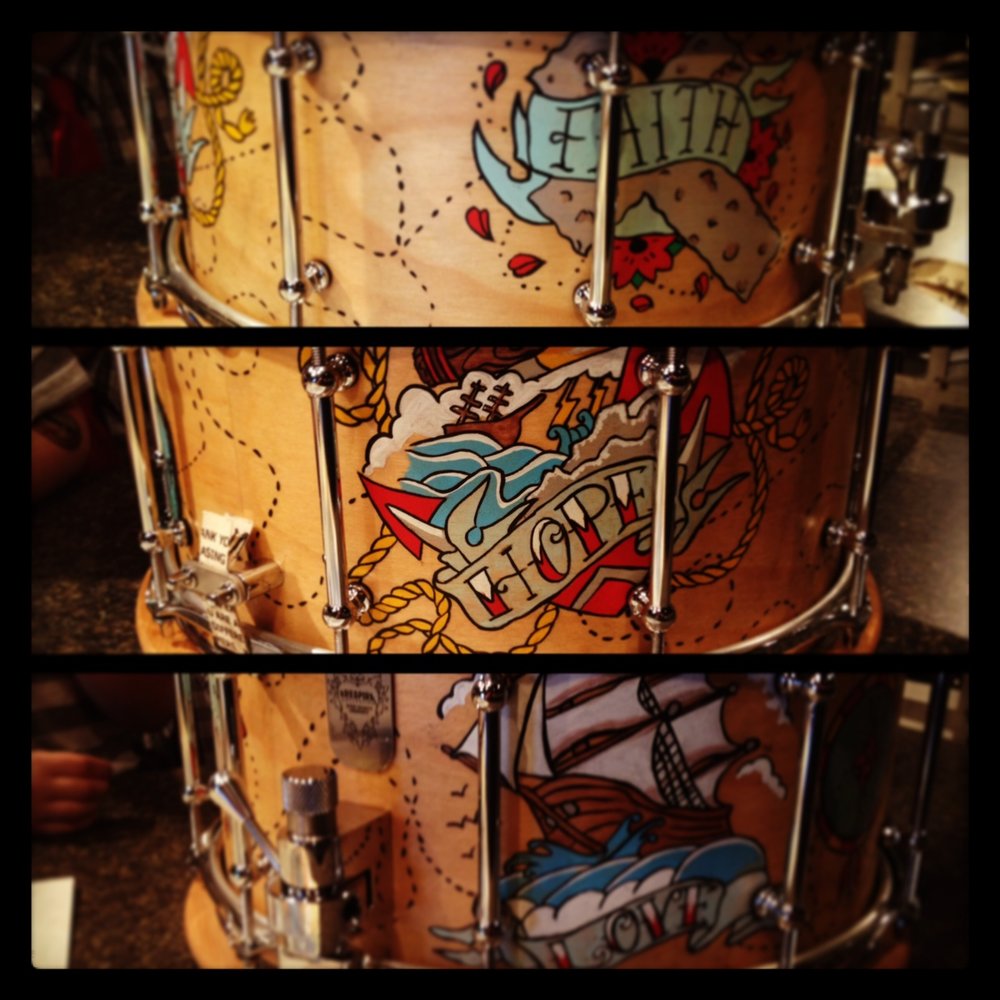
Liz Aponte is a female drum-maker. As in, she owns a business, the Respira Collective, and makes drum kits from scratch and sells them. By her own hands. Why is this not headline news at the New York Times? Respira drums also happen to be beautifully crafted, custom, and incredibly unique.
There’s more. Aside from Respira Collective, Liz is part of another company, Full Circle Co., that makes jewelry and other accessories, like bottle openers, from broken cymbals.
She is also a drum teacher, primarily for other female-identified percussionists who want to Crush It in a male-dominated field. On Instagram, she counts Questlove among her followers, who publicly commented, reposted, and shared Liz’s video of her young student receiving her first drum kit for Christmas; the reaction was priceless and adorable.
Liz is a drummer in her own band (Swans of Never), a church service drummer, and has toured all across the nation and performed in some of its most historic music venues. Read our Q&A with Liz below.
Photos, Jennifer Arthur-Tomor
“Just freakin’ do it. You might fail or fall, but in the end it’s all about getting back up and going for it.”
[Tom Tom] Can you tell us a bit about your background and how you became a musician?
[Liz] I’m originally from Moorpark, California, a little town in Southern California, but now live in Salt Lake City, Utah. I started playing drums when I was 13, and have been obsessed with it ever since. By the time I was 15, I had played in places like The Whiskey, The Roxy, The Knitting Factory and The Ventura Theater.
After high school, my musical journey took me to play on Warped Tour, start a custom drum company [Respira], and even work for Meinl Cymbals in Nashville, Tennessee.
While my parents weren’t musicians themselves, I grew up around different types of music. My Dad was into Jimi Hendrix and Led Zeppelin, while my Mom was into Bomba and Plena. That really set the course for me and after trying every instrument (even trombone), I finally settled on drums. When I first picked up a friend’s drumsticks, I loved it. I’m generally a pretty quiet person, but for some reason I love to hit things and make noise, so drums sort of came naturally for me.
What bands have been influential in your life as a drummer? As a listener?
Bands like Thrice, Strung Out and No Doubt were huge for me in the early days. I was amazed by the fast punk playing, but also vocal styles and rad bass lines. I loved it all.
As a listener, one of my favorite artists is Brooke Fraser. The complete opposite of punk, but her album “Albertine” changed my life. It’s a perfect record in my opinion and really taught me the meaning behind an amazing song and a meaningful album; not just a compilation of notes and songs.
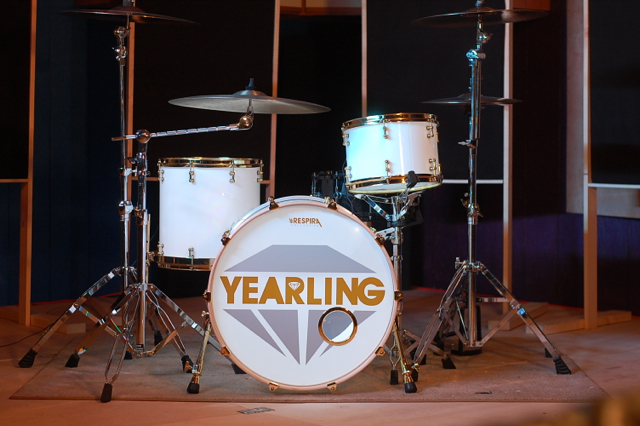 Your company, Respira Collective, builds drumkits from scratch. To my knowledge, you are the only woman-owned drum manufacturing company in the United States. I find this thrilling! How did you begin making drums?
Your company, Respira Collective, builds drumkits from scratch. To my knowledge, you are the only woman-owned drum manufacturing company in the United States. I find this thrilling! How did you begin making drums?
I’m weirdly obsessed with figuring out how things work and asking a lot of questions. When I was 12 I wanted the cool custom drumkits that were becoming popular, but I obviously didn’t have the budget for it. I ended up taking apart my existing drumkit and putting it back together to see how everything worked.
From there, and with the help of my Dad, I bought individual parts and just figured it out. I loved the thought of having in idea for how a kit should sound and look, and figuring out how to make it a reality. It’s not easy, but it’s so worth it.
Once I made my own snare drum (which I still play to this day), I brought it to local shows and offered other drummers to play it. From there, a local drummer asked me to make him a kit, and it just snowballed from there!
I’ve met so many amazing people through making drums. It’s crazy to think what my life would be life without it, and without music. I wouldn’t be married to who I am, I’d have completely different friends; it’s surreal.
What does “Respira” mean and why did you choose that as your business name?
Respira means “to breathe” in Spanish. I’m half Puerto Rican, so I grew up around Spanish culture: food, music, language, etc. It’s a big part of who I am. I always thought Respira sounded cool, but also had so much meaning.
We obviously need to breathe to survive, but we also all breathe the same air. We exchange little particles of ourselves with the people that are around us when we inhale and exhale: that’s a crazy concept. I would also notice that whenever I would drum and get nervous about a tough part or upcoming fill, I would literally forget to breathe and hold my breath. This would cause my tempo to get wobbly and pretty much mess the part up. I had to intentionally tell myself to continue to breathe.
Respira Collective also has a focus on community and giving back. That’s where the “Collective” comes from and our slogan “Breathing is Meaning.” Sometimes that reminder to continue to breathe, that our every breath has meaning, and to put one foot in front of the other can save lives. That truth has helped me in dark places.

What materials do you prefer to use?
The rad thing with drums is that there is an endless amount of possibilities with sound, look, performance, etc. I do love birch wood; it gives a great attack and the grain looks phenomenal.
How long does making a typical kit take and do you have a studio to complete each piece?
It can takes about a month to complete a drum kit due to how labor intensive and intricate each step of the process is, there’s no room for error. I have a home studio where I house all of my parts, tools and complete each drum kit.
Since each kit is custom, can you give us an example of various styles?
Maple kits are the most popular and most versatile. I’ve made maple kits out of wraps like glass glitter and sparkle, paisley fabric and so many stain colors. I’ve also made acrylic drum kits (John Bonham inspired!) with LED lights in them. I will say that one of my favorite designs ironic because it’s very simple: it’s a light turquoise stained kit that still shows the grain. Classic but you can tell it’s totally custom and it sounds amazing as well.

Your other company, Full Circle Co., makes jewelry and other accessories from broken cymbals. What was your inspiration?
Being a drummer, I was cracking and breaking my cymbals and had no clue what to do with them. I didn’t want to throw them away, but they were taking up room so I would try different DIY projects with them.
I’m not much of a flashy person, but I do like meaningful jewelry and would always have a hard time finding jewelry that was simple, could go with most any outfit and had a story behind it.
Things have changed so much the past few years with social media; for instance, Questlove follows you and comments on your posts! That must be exciting.
It’s absolutely insane and should not be happening, haha! There’s no reason for one of the biggest and influential musicians out right now to follow my Instagram account of weird faces, drum mess ups and my awesome students, yet here we are.
The video with your student, Lyla, was beyond adorable. What is your approach with students of various ages?
Isn’t she the best?! My approach is pretty similar with any student, whether they’re 6 or 60: find out why they want to play drums and what their ultimate goal is, and then create a roadmap to assist in achieving their goal with as much encouragement as I can along the way. When the desire is there, I see my job as just directing them along the path of self discovery.
What drew you to teaching, since you focus specifically on female-identified drummers? 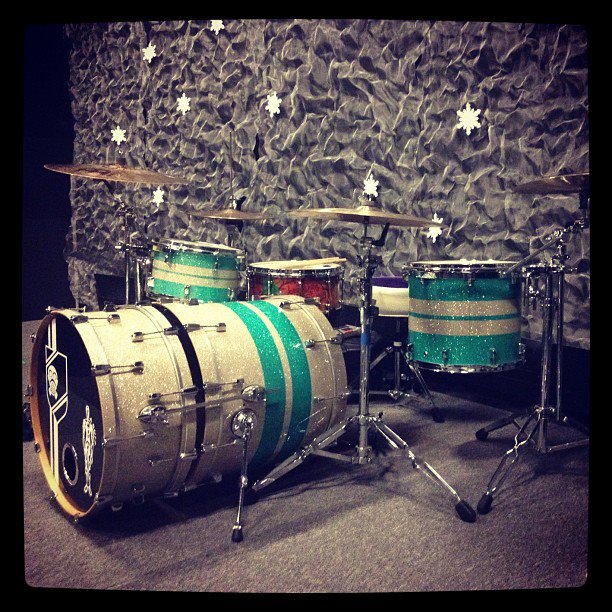
The joy of helping someone learn their first drumbeat, or having something that was a huge struggle just “click” is beyond amazing. My Mom is a retired teacher so I was always around and learning how to build a curriculum, how to personalize teaching and how to see the potential in people and bring out the best in them. I have a lot of empathy because I’ve been there, stuck in a rut with my drumming or being beyond frustrated. The fact that I have the potential to help people blow through those hurdles is humbling. It’s definitely a passion of mine.
Are you currently in a band? What kind of music do you play?
I do have a few projects I’m a part of: with my band Swans of Never, I play at my church Ekklesia here in Salt Lake City, and I have a few digital projects with previous bandmates where we collaborate and send each other parts, which has been a ton of fun. I play anything from rock, to metal, to acoustic, to worship, to hip hop, to folk. I love it all!
There seems to be a lack of woman-owned drum shops; why do you think that is?
With the music industry being male dominated, I think for a long time it hasn’t been very welcoming to be a female in the music industry. I do believe the landscape is changing, and I know for myself personally, I’ve been encouraged by the power of social media and being able to connect with other female drummers and female drum builders. I literally did not know there were other female drum builders out there! For a long time I thought I was the only one.
Has being a woman ever affected the way people treat you within the music business?
Absolutely, there’s been a lot of really, interesting comments and interactions that I’ve experienced. To be honest, while mostly not positive, I’ve learned to have thick skin but also the importance of still being kind and generous, while being shrewd and in control. And I’m thankful for that. I’m thankful that it hasn’t been easy.
I’ve struggled a lot with self-doubt and just never feeling good enough in my playing because I feel I’ve been treated differently. For a long time, it stopped me from practicing, from progressing. I would sit at a kit and just not know what to do. It felt passionless and I think the doubt came from either what other people have said of me, or even what I think other people think of me. Once I learned to move forward despite what anyone else says, a burden was lifted from me. The passion came back.
One funny interaction that I’ll share is when I was touring in the Southeast part of the US, and I noticed the bathroom at the venue was out of toilet paper. So I asked the owner for some toilet paper, and he said “No, you can’t. We don’t let women use our toilet paper.” I thought he was joking, you know how people sometimes joke like that? But, he wasn’t. It made no sense at all. I thought maybe I missed the punchline or some reference. That was an experience, for sure.
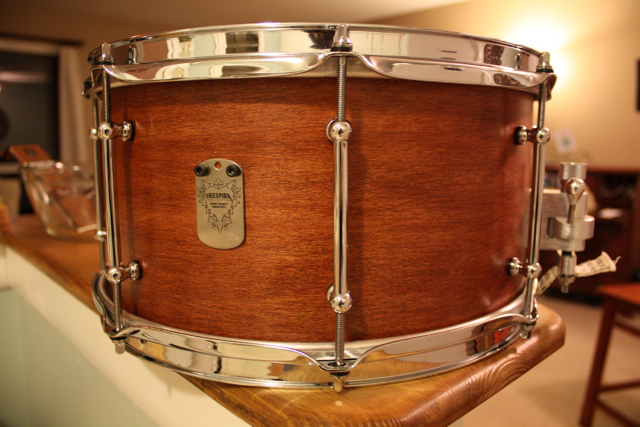 You offer lessons in-person and via Skype; what is the most common thing students want to improve?
You offer lessons in-person and via Skype; what is the most common thing students want to improve?
I’ve noticed that sometimes people don’t even know what they want to improve. I always start my new students with figuring out what their ultimate goal is. Is it to play in a band? Is it to learn a style of music? Is it to prove someone wrong? Once I know their goal (or help them to define a goal), I then see it as my job to create practical steps to get them there, and to be inspired achieve other goals they didn’t even know existed.
When I do sit down at a kit, my routine looks like this:
- Warm Up: Jamming along to songs, getting warmed up with something familiar and having fun
- Something New: I’ll choose 1 thing to learn or improvement upon, whether it’s learning a fill from a song, applying a rudiment to the kit (my current fav is the 9-stroke roll), or working on hand / foot speed and control, etc.
- Application: I’ll then take what I worked on in #2 and apply it to a song I was warming up on during #1 or pick a completely random song to try to adapt it to.
Do you have any tricks for making practice “fun”—for instance, drilling rudiments?
Definitely! I love taking a rudiment, or an idea, and just applying it around the kit, and even to songs. I make it a game to push myself: how many ways can I implement these rudiments? How crazy can I get it to sound? If I were playing in a latin band, how would it fit?
I have 2 drum kits set up in my studio for my drum students, but also for friends to come over and shed. That definitely makes practice fun – just learning from other people.
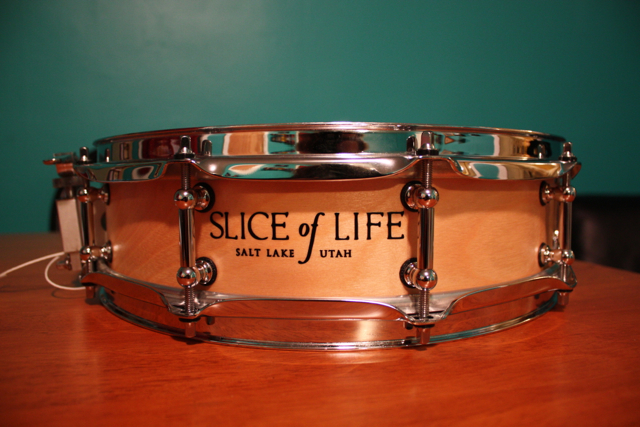
What is your current kit set-up and what is your dream kit?
I feel very fortunate that my current set up is my dream kit. I guess that’s what happens when you make the drums you play
My main kit is a clear acrylic Respira kit (9×12, 14×16, 20×22) with a 7×14, 10 Ply Maple snare.
I use all Meinl Cymbals – 14” Dark Hats, 20” Jazz Medium Thin Ride (used as a crash), 20” Sand Ride and an 18” Extra Dry China. The Jazz Medium Thin Ride is my favorite cymbal ever. I love it as a crash.
I use all DW Hardware, including my 500 Series lefty double bass pedal!
What do you like to do in your “off” time?
I feel very fortunate enough to make music my full time gig, which also means I don’t have a lot of off time. But one thing I love is working out. It’s a goal of mine this year to get stronger, so I’ve been enjoying going to the gym, hiking and weight lifting. Nothing too crazy, but I love the feeling after a good work out. I feel on top of the world. It’s been awesome to be able to notice an improvement too, even in my drumming. I feel I don’t get as winded and have more endurance in drumming.
Who has influenced or inspired your drumming style over the years?
There have been so many people, but one that sticks out is my friend Matt Greiner of August Burns Red. I love the way he approaches the kit and while he plays metal, I’m not really impressed with his blast beats or speed as I am with his creativity. With each one of their new records, he is creating new beats and I can tell he’s spent so much time to sit down and write meaningful drums part, when he really could get away with writing generic parts. I appreciate the way that he honors his craft and doesn’t take it for granted.
If you could recommend one exercise for improving one’s skills quickly, what would it be?
It would be the mental shift that nothing great comes quickly, and that the long game outweighs the short game, especially in music and drumming. Other than that, just make sure you’re in it everyday – whether it’s playing, or listening, or learning – just go for it.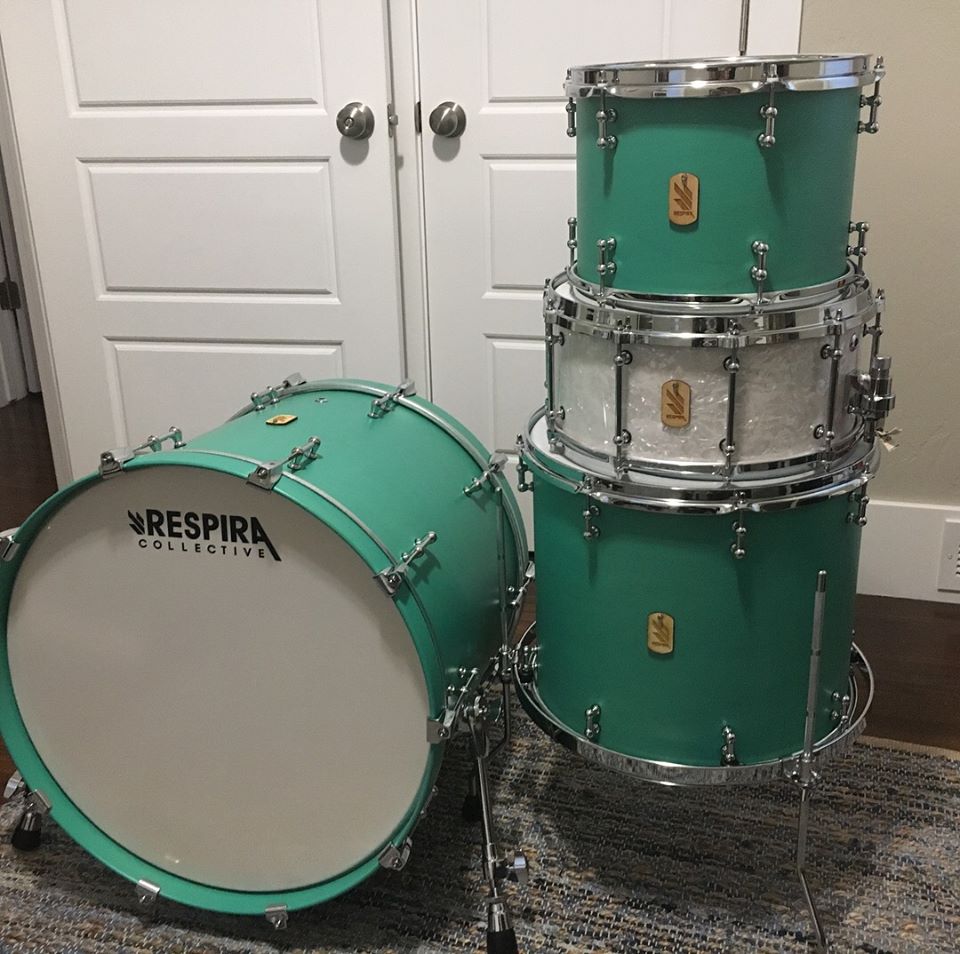
Do you have any advice for aspiring drummers?
You’ve got this: write down some goals, connect with other drummers, don’t be afraid to get creative and remember to play and remember WHY you play. Can’t wait to see what you contribute to the drumming and music world
Tom Tom turns ten this year. If you could go back in time ten years, what piece of advice would you give yourself?
Happy Birthday, Tom Tom! Ten is a huge accomplish and what you’ve done for female musicians is incredible. So first, THANK YOU!
Also, this is a great question. To be honest, I can struggle with a lot of regret for not being as focused and dedicated in my past as I am now. I’m learning that it’s never too late and there’s so much life to live. Looking back does no good. Looking forward is everything. I would tell myself to do whatever the hell you want and don’t be so wrapped up in what other people may think. Just freakin’ do it. You might fail or fall, but in the end it’s all about getting back up and going for it, no matter what age you are.



